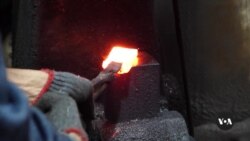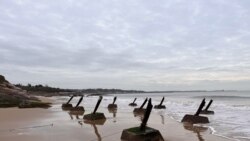ເກາະຄິນເໝິນທີ່ປົກຄອງໂດຍໄຕ້ຫວັນ ເປັນເກາະທີ່ຕັ້ງຢູ່ພຽງບໍ່ເທົ່າໃດກິໂລແມັດຈາກປະເທດຈີນ. ເກາະດັ່ງກ່າວ ເປັນເຂດແນວໜ້າທໍາອິດສໍາລັບການປ້ອງກັນປະເທດຈາກຈີນຂອງລັດຖະບານໄຕ້ຫວັນ. ຊ່າງຕີເຫຼັກຄົນນຶ່ງໃນເກາະຄິນເໝິນ, ຜູ້ທີ່ມີຊື່ສຽງໂດ່ງດັງຈາກສິ່ງທີ່ລາວເອົາມາໝຸນໃຊ້ໃໝ່, ລາວພະຍາຍາມຫັນປ່ຽນວັດຖຸທີ່ພົວພັນກັບຄວາມຮຸນແຮງໃນອະດີດຂອງເກາະດັ່ງກ່າວ ໃຫ້ກາຍມາເປັນສັນຍາລັກແຫ່ງສັນຕິພາບ.
ທ່າມກາງຄວາມຮ້ອນແລະສຽງນອງນັນ, ລຸງຫວູ ເຊັງ-ດົງ (Wu Tseng-dong) ກໍາລັງປ່ຽນສິ່ງທີ່ຖິ້ມແລ້ວ ໃຫ້ກາຍມາເປັນເຄື່ອງມືຕ່າງໆ.
ລຸງຫວູ ເຊັງ-ດົງ, ຊ່າງຕີເຫຼັກໃນເກາະຄິນເໝິນ ກ່າວເປັນພາສາຈີນກາງວ່າ:
"ວັດສະດຸຕ່າງໆທີ່ພວກເຮົານໍາໃຊ້ ສ່ວນຫຼາຍແມ່ນປອກລູກປືນໃຫຍ່ທີ່ຖືກນໍາໃຊ້ໃນອະດີດ."
ໃນເມື່ອກ່ອນ, ເກາະຄິນເໝິນ ແມ່ນສະໜາມລົບ, ແລະແຫຼ່ງຊັບພະຍາກອນທັງຫຼາຍແມ່ນຂາດເຂີນຫຼາຍສຳລັບປະຊາຊົນທີ່ອາໄສຢູ່ໃນເກາະແຫ່ງນີ້. ເມື່ອເຕີບໃຫຍ່ຂຶ້ນມາ, ລຸງຫວູ ກ່າວວ່າ ປືນໃຫຍ່ທີ່ຍິງໄປມາລະຫວ່າງຈີນ ແລະໄຕ້ຫວັນ ແມ່ນສ່ວນນຶ່ງຂອງຊີວິດປະຈໍາວັນຢູ່ທີ່ນີ້.
ລຸງຫວູ ກ່າວເປັນພາສາຈີນກາງວ່າ:
“ບາງຄັ້ງ ເຈົ້າອາດຈະພົບເຫັນປອກລູກປືນໃຫຍ່ຫຼາຍ ໃນເວລາຍ່າງອອກໄປກາງເດີ່ນ. ບາງຄັ້ງ ເມື່ອມີການຂຸດຢູ່ສະຖານທີ່ກໍ່ສ້າງ ພວກເຂົາເຈົ້າຈະຂຸດປອກລູກປືນທັງຫຼາຍຂຶ້ນມານໍາ.”
ນີ້ແມ່ນສິ່ງເສດເຫຼືອໃນຊ່ວງສົງຄາມກາງເມືອງຂອງຈີນ.
ທ່ານລູ ເກັນເຈນ (Lu Genjenn), ຜູ້ບໍລິຫານໃຫຍ່ຢູ່ທີ່ພິພິທະພັນປະຫວັດສາດ ແລະນິທານພື້ນເມືອງຂອງເກາະຄິນເໝິນ ກ່າວເປັນພາສາຈີນກາງວ່າ:
"ນັບຕັ້ງແຕ່ປີ 1949, ທະຫານກົກມິນຕັງ ຫຼື KMT ໄດ້ເຂົ້າມາເກາະຄິນເໝິນ. ນະທີ່ນີ້ ຍັງກາຍເປັນຖານທີ່ໝັ້ນຂອງກອງທັບ KMT ເພື່ອທີ່ຈະຢຶດເອົາຈີນແຜ່ນດິນໃຫຍ່ຄືນມາອີກຄັ້ງ.”
ປີ 1949, ຍັງເປັນປີທີ່ ທ່ານໝາວ ເຈີຕຸງ ໄດ້ສ້າງຕັ້ງປະເທດສາທາລະນະລັດປະຊາຊົນຈີນທີ່ປົກຄອງໂດຍພັກຄອມມູນິສຈີນ. ກອງທັບກົກມິນຕັງ ຫຼື KMT ທີ່ໄດ້ຮັບຄວາມຜ່າຍແພ້, ລັດຖະບານ ໄດ້ຖອຍກັບຄືນໄປໄຕ້ຫວັນ, ແລະຮ້ອງດິນແດນແຫ່ງນີ້ວ່າ ສາທາລະນະລັດຈີນ. ນັບຕັ້ງແຕ່ນັ້ນມາ, ໃນເກາະຄິນເໝິນທີ່ປົກຄອງໂດຍລັດຖະບານກົກມິນຕັງ ບັນຫາຂັດແຍ້ງນັ້ນກໍຍັງຄົງສືບຕໍ່ດ້ວຍການຍິງປືນໃຫຍ່ຕອບໂຕ້ກັນເປັນໄລຍະໆ ຈົນເຖິງຊຸມປີ 1970. ໃນນັ້ນ ຍັງລວມທັງການຍິງປືນໃຫຍ່ເປັນເວລານຶ່ງເດືອນເຄິ່ງ ທີ່ໄດ້ເລີ້ມຕົ້ນຂຶ້ນ ໃນວັນທີ 23 ສິງຫາ ປີ 1958. ລູກປືນໃຫຍ່ຫຼາຍແສນລູກຕົກຖືກເກາະຄິນເໝິນ. ເມື່ອການຕໍ່ສູ້ສິ້ນສຸດລົງ, ພັກຄອມມູນິສ ແລະ ພັກກົກມິນຕັງ ໄດ້ຕົກລົງກັນໃນການຍິງປືນໃຫຍ່ແບບຫວ່າງມື້.
ດ້ວຍການສະໜອງວັດຖຸດິບທີ່ມີຢ່າງຫຼວງຫຼາຍ, ປອກລູກປືນເຫຼົ່ານີ້ ໄດ້ກັບມາມີຊີວິດໃໝ່ດ້ວຍມືຂອງ ລຸງຫວູ.
ລຸງຫວູ ກ່າວເປັນພາສາຈີນກາງວ່າ:
“ພວກເຮົາກໍາລັງຜະລິດເຄື່ອງທີ່ເປັນປະໂຫຍດຈາກສິ່ງເສດເຫຼືອ ດ້ວຍການຜະລິດເຄື່ອງໃຊ້ສໍາລັບບ້ານເຮືອນ ແລະ ມີດ.”
ເອລິສຊາເບັດ ລີ, ນັກຂ່າວ VOA ກ່າວວ່າ:
ຢູ່ສະຖານທີ່ຂອງອາຈານ ຫວູ, ຈະໃຊ້ເວລາປະມານ 30 ນາທີເພື່ອຜະລິດມີດນຶ່ງເຫຼັ້ມ, ແລະທ່ານສາມາດຜະລິດມີດໄດ້ປະມານ 60 ເຫຼັ້ມຈາກປອກລູກປືນຄົກລູກນຶ່ງ.
ລຸງຫວູ ຜະລິດມີດມາເປັນເວລາ 50 ປີແລ້ວ. ໃນເວລານັ້ນ, ລາວໄດ້ເຫັນການປ່ຽນແປງຂອງຈີນ, ມັນສະແດງໃຫ້ເຫັນຢ່າງຈະແຈ້ງທີ່ສຸດໃນເວລາກາງຄືນຂອງຕອນນັ້ນ.
ລຸງຫວູ ເຊັງ-ດົງ ກ່າວເປັນພາສາຈີນກາງວ່າ:
“ເມື່ອຢ້ອນກັບຄືນໄປໃນຊ່ວງໄລຍະເວລາຂອງ 30 ປີກ່ອນ, ຈີນ ພັດທະນາຂຶ້ນຢ່າງຕໍ່ເນື່ອງ. ເມື່ອເຮົາໄປທີ່ນັ້ນ ແລ້ວປຽບທຽບໃສ່ໃນການໄປໄທເປ, ຂ້າພະເຈົ້າບໍ່ຮູ້ສຶກ...ມັນຍາກຫຼາຍທີ່ຈະບອກວ່າ ເປັນປະເທດຄອມມູນິສ. ຫຼາຍໆໂຕເມືອງຂອງພວກເຂົາເຈົ້າ, ສະຖາປັດຕະຍະກຳຂອງພວກເຂົາເຈົ້າ ແມ່ນແຕກຕ່າງກັນຢ່າງສົມບູນແບບກັບວິຖີຊີວິດທີ່ພວກເຮົາເຄີຍຈິນຕະນາການວ່າ ຈີນຈະເປັນແບບໃດ.”
ປະຊາຊົນຫຼາຍໆຄົນທີ່ອາໄສຢູ່ໃນເກາະຄິນເໝິນຫວັງວ່າ ໃນຂະນະທີ່ຈີນກ້າວໄປໜ້ານັ້ນ, ອາດຈະມີພື້ນຖານທີ່ມີຮ່ວມກັນຫຼາຍຂຶ້ນ ລະຫວ່າງສອງຝັ່ງຂອງຊ່ອງແຄບໄຕ້ຫວັນ, ເຖິງແມ່ນວ່າ ອຸດົມການຂອງພັກຄອມມູນິສຈີນ ແລະການປົກຄອງດ້ວຍລະບອບປະຊາທິປະໄຕຂອງໄຕ້ຫວັນ ຈະແຕກຕ່າງກັນກໍຕາມ.
ລຸງຫວູ ເຊັງ-ດົງ ກ່າວວ່າ:
"ພວກເຮົາພຽງແຕ່ຫວັງວ່າ ທັງສອງຝ່າຍຂອງຊ່ອງແຄບ ຈະສາມາດນໍາໃຊ້ວິທີການທີ່ອ່ອນໂຍນ ແລະໃນທິດທາງແຫ່ງສັນຕິພາບ ໃນການເຂົ້າຫາເຊິ່ງກັນ ແລະກັນ, ແທນທີ່ຈະຄັດຄ້ານກັນຢ່າງດຽວ."
ບາດແຜຂອງການຕໍ່ສູ້ ຍັງຄົງມີຢູ່ໃນເກາະຄິນເໝິນ. ເຖິງແມ່ນປະຊາຊົນໃນເກາະຄິນເໝິນ ຈະຫວັງໃຫ້ມີສັນຕິພາບ ຖ້າຫາກເກາະແຫ່ງນີ້ກາຍມາເປັນສະໜາມລົບອີກຄັ້ງ ກໍຕາມ.
ລຸງຫວູ ເຊັງ-ດົງ ກ່າວເປັນພາສາຈີນກາງວ່າ:
"ພວກເຮົາ ລື້ງເຄີຍກັບມັນແລ້ວ. ຖ້າພວກເຮົາຢ້ານ, ພວກເຮົາທັງໝົດກໍຄົງຈະໜີໄປໄຕ້ຫວັນໃນລະຫວ່າງການຍິງປືນໃຫຍ່ໃສ່ກັນຄັ້ງໃຫຍ່ ເມື່ອວັນທີ 23 ສິງຫາພຸ້ນແລ້ວ.”
ສໍາລັບວຽກງານສ່ວນນຶ່ງຂອງລາວ, ລຸງຫວູ ຫວັງວ່າ ໂດຍການຫັນປ່ຽນສິ່ງທີ່ທຳລາຍສ້າງຄວາມເສຍຫາຍ ໃຫ້ກາຍມາເປັນມີດ, ລາວສາມາດຕັດອະດີດຂອງຄວາມຮຸນແຮງໃນເກາະຄິນເໝິນ ຂະນະດຽວກັນ ລາວຫວັງໃຫ້ມີຄວາມສະຫງົບສຸກທີ່ຍືນຍົງສໍາລັບເກາະຄິນເໝິນ.
Taiwan-ruled Kinmen is an island only a few kilometers from China. It has been the first line of defense against China for Taiwan’s government. One blacksmith in Kinmen, made famous by what he recycles, is trying to turn objects of the island’s violent past into a symbol of peace. VOA’s Elizabeth Lee has more.
In the middle of the heat and noise, Wu Tseng-dong turns what is trash into tools.
Wu Tseng-Dong, Kinmen Blacksmith,
“The materials we use are mostly the spent (used) artillery shells from the past.”
In the past, Kinmen Island was a battleground, and resources were scarce for residents. Growing up, Wu says, artillery shells fired back and forth between China and Taiwan were a part of everyday life here.
Wu Tseng-Dong, Kinmen Blacksmith,
“Sometimes you’ll find artillery shells when walking out in the fields. Sometimes when digging at a construction site, they’ll dig up shells.”
These are the remnants of the Chinese civil war.
Lu Genjenn, Kinmen Museum of History and Folklore Director,
“Since 1949, the KMT military came to Kinmen. This also become the base for the KMT military to retake mainland China.”
1949 was also the year Mao Zedong established the communist-ruled People’s Republic of China. The defeated Kuomintang, or KMT, government retreated to Taiwan, and called it the Republic of China. Since then, in KMT-ruled Kinmen, on-and-off conflict continued with artillery fire until the 1970s. That included a month and a half of shelling that started on August 23, 1958. Hundreds of thousands of shells hit Kinmen. When that ended, the communists and KMT agreed to shell each other on alternate days.
With an ample supply of raw material, these shells take on a new life in Wu’s hands.
Wu Tseng-Dong, Kinmen Blacksmith,
“We’re making something useful out of waste. Making household tools and knives.”
Elizabeth Lee, VOA News.
Here at Maestro Wu’s, it takes about 30 minutes to make one knife, and you can make about 60 knives out of one mortar shell.
Wu has been making knives for 50 years. In that time, he has seen China change – it’s most obvious at night.
Wu Tseng-Dong, Kinmen Blacksmith,
“Going back and forth in these 30 years, China keeps improving. // When we go there compared to going to Taipei, I don’t feel – it’s hard to tell that it’s a communist country. Their cities, architecture is completely different from the way we used to imagine how China would be.”
Many Kinmen residents hope as China progresses, there would be more common ground between the two sides of the Taiwan Strait, even as the ideologies of communist China and democratically ruled Taiwan differ.
Wu Tseng-Dong, Kinmen Blacksmith,
“We only hope both sides of the strait can use gentle and peaceful approach toward each other, instead of one of opposition.”
The scars of battles are still visible in Kinmen. Even as Kinmen residents hope for peace, if the island becomes a battlefield again…
Wu Tseng-Dong, Kinmen Blacksmith,
“We’re used to it. If we were afraid, we would have all fled to Taiwan during the August 23 artillery shelling.”
For his part, Wu hopes by transforming what was something destructive into knives, he can cut off Kinmen’s violent past as he hopes for enduring peace for Kinmen.







ຟໍຣັມສະແດງຄວາມຄິດເຫັນ